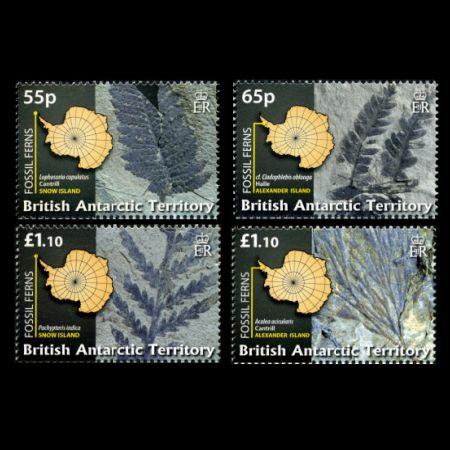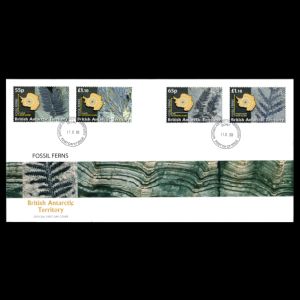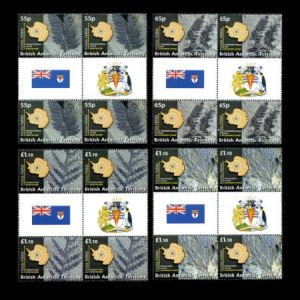British Antarctic Territory 2008 "Fossil Ferns from the Antarctic"
| <prev | back to index | next> |
| Issue Date | 17.11.2008 |
| ID | Michel: 475-478, Scott: 401-404, Stanley Gibbons:, Yvert et Tellier: 472-475, Category: pF |
| Author | Designer: CASCO Studio; Photographs: British Antarctic Survey |
| Stamps in set | 4 |
| Values |
55p - Lophosoria cupulatus, Cantrill - Snow Island 65p - Cladophlebis oblonga, Halle - Alexander Island 1.10 - Aculea acicularis, Cantrill - Alexander Island 1.10 - Pachypteris indica - Snow Island |
| Emission/Type | commemorative |
| Issue place | Signy |
| Size (width x height) | 28.45mm x 42.58mm |
| Layout | Sheet of 20 (2 x 10) |
| Products | FDC x1 |
| Paper | watermarked CA Spiral |
| Perforation | 14 |
| Print Technique | Lithography |
| Printed by | BDT International Security Printing Ltd |
| Quantity | |
| Issuing Authority | The Falkland Islands Philatelic Bureau |

On 17th November, 2008, The Falkland Islands Philatelic Bureau, on behalf the British Antarctic Territory, issued the stamps set "Fossil Ferns from the Antarctic".
Antarctica is extremely important to the science of geology because it formed the centre of an ancient supercontinent called Gondwana which also included South America, Africa, India, Australia and New Zealand.
The study of Antarctic rocks and fossils therefore helps geologists to understand the geological histories of all the southern continents.
Gondwana started to break up 180 million years ago and the separate continents drifted apart on different tectonic plates over the next 150 million years. Geologists are still uncertain exactly how the breakup took place and some suggest it was caused by abnormally hot upwellings of magma, or mantle plumes from deep below the Earth's surface.
The British Antarctic Survey holds an extensive collection of Antarctic Fossils and those featured on this set of postage stamps are Pteridophyta (ferns). Snow Island is part of the South Shetlands archipelago, a chain of islands extending over 500km, separated from the nearby Antarctic Peninsula by the Bransfield Strait and from South America by the Drake Passage. Both fossil ferns featured on stamps were found at President Head on Snow Island. Many important fossil finds have been made at Alexander Island; both our featured fossils were discovered at Coal Nunatak.
Products
| FDC | Guitar pair | |
 |
 |
|
| The first day cover design features Two Step Cliffs on the mid-eastern side of Alexander Island, the location of a long-term research site. |
References

|
Acknowledgements
Many thanks to Dr. Peter Voice from Department of Geological and Environmental Sciences, Western Michigan University, for his help to find an information for this article, the draft page review and his very valuable comments.| <prev | back to index | next> |